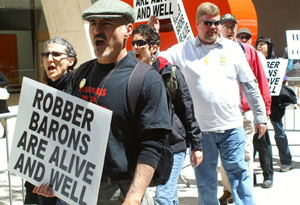Thousands of New Yorkers gathered on Broadway outside Manhattan’s City Hall April 29 calling for good jobs for working people and accountability from Wall Street. The entire four blocks of Broadway along City Hall Park was full of union members, community and housing activists, and retirees with signs declaring “Reclaim America,” “Hold Wall Street Accountable,” and “Make Wall Street Pay.”
The AFL-CIO and National People's Action, the principal rally organizers, said turnout was 15,000. The event began with the familiar lineup of New York City labor leaders, but quickly took a turn away from the usual suspects. Sean Banks, a young African-American middle school teacher in Brooklyn, told the crowd “it’s wrong to make our kids pay for this mess.” Job losses at public schools and colleges nationwide could reach 100,000 next school year, including 8,500 in New York alone, as the city’s schools face a deficit of up to $1.2 billion.
Banks was followed by Adolfo Abreu, a 17-year-old high school student, who asked what kind of future he and his fellow students can expect in the current climate, and called on the crowd to fight for good jobs.
Protesting Wall Street's Pirates
The Wall Street action from the point of view of labor activists here in Albany, New York’s Central District was successful, since we went down with a bus of IUE-CWA Local 81359 workers who picketed the headquarters of private equity firm Apollo Management for a couple of hours before heading to the action.
Apollo bought the IUE-CWA members' company three years ago, renamed it Momentive Productive Materials, and unilaterally hit production workers mid-contract with a 50 percent pay cut. The IUE-CWA local has mobilized to fight since then, and is testing out a work-to-rule.
The IUE-CWA bus was joined by another organized by the Capital District Labor Federation that also picked up people in the Mid-Hudson region.
The picket in front of Apollo’s dark tower was spirited and militant. One of the Momentive workers had on a Jack Sparrow costume that got a lot of attention all day. Others carried signs that played on their company’s new name, refashioning it to “Making People Miserable.”
The AFL-CIO rally was pretty much standard issue, a bunch of speeches followed by a march with lots of chanting through the pen that the NYC police department set up on Broadway to funnel us next to the traffic.
On the bus home, we watched Michael Moore’s movie “Capitalism: A Love Story,” an appropriate entertainment, I thought.
—Jon Flanders
Four community activists, women of color active in groups like Community Voices Heard, Families United for Racial and Economic Equality, and Good Old Lower East Side, pointed out the ways poor New Yorkers have been hit especially hard by the recession, including a continuing foreclosure crisis, and called for change.
There were medium-sized groups from a number of different unions, including AFSCME District Council 37, Communications Workers Local 1180, Transit Workers Local 100, the Electrical Workers, Teachers (UFT), and others. There were small groups of members wearing blue Actors Equity shirts, white UFT hats, and black operating engineer jackets, but not the huge delegations that often characterize the city’s labor rallies. The march down Broadway to the stock market bull was more of a stroll than a militant march, but it was a beautiful afternoon and a lot of people seemed happy to be out in the sunshine in a big crowd of people who all believe jobs should come first.
The mood of the rally was more mellow than rowdy. But participants were calling for big changes, in their signs and in their conversations. “The economy suffered a drastic collapse, and the only thing that will work is a drastic solution,” said Terrence DeMaso, a Verizon technician and member of CWA Local 1101.
There weren’t a lot of concrete solutions put forward from the podium. AFL-CIO President Richard Trumka exhorted Wall Street executives to “fix the mess that you made.” Trumka called for the big banks to stop fighting Wall Street reform, to stop speculating and start lending, and pay their fair share of the cost to create jobs they destroyed.
Surely there were many different opinions in the crowd about a solution should look like, but most people would probably have agreed with CWA member Joe Gonzalez, who said, surveying the steady stream of protestors walking by the bull, “this is definitely an eye-opener. There are a lot of questions that need to be answered.”
Pam Galpern is a member of CWA Local 1101.







